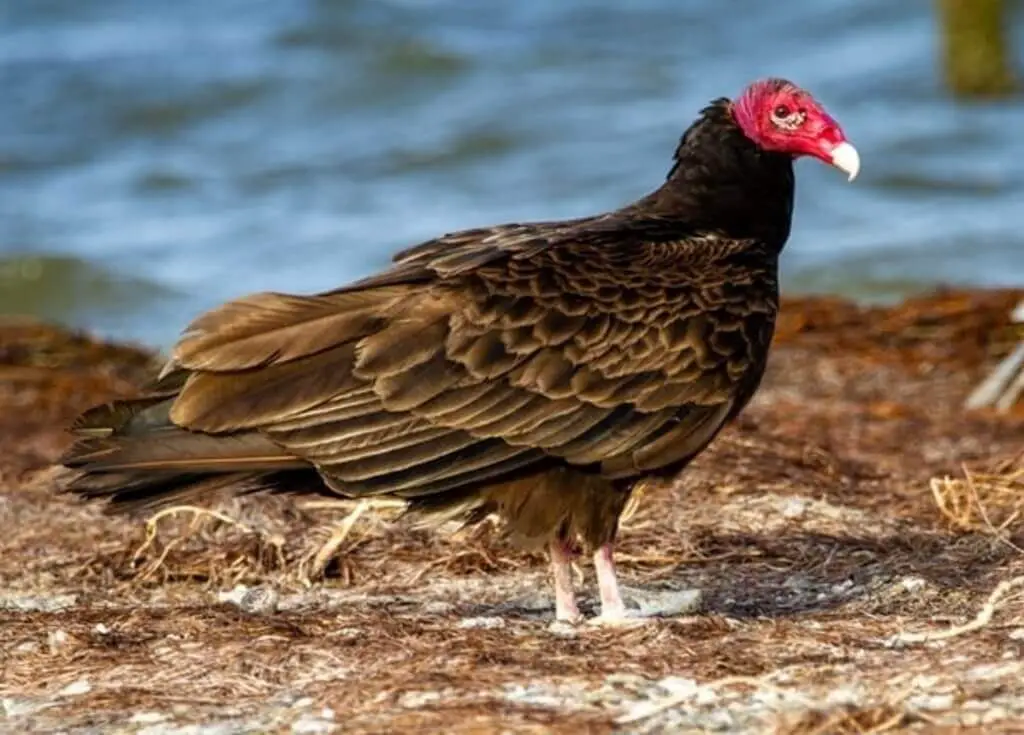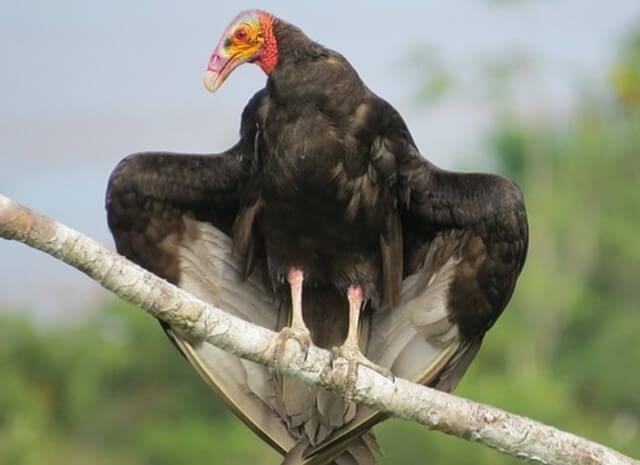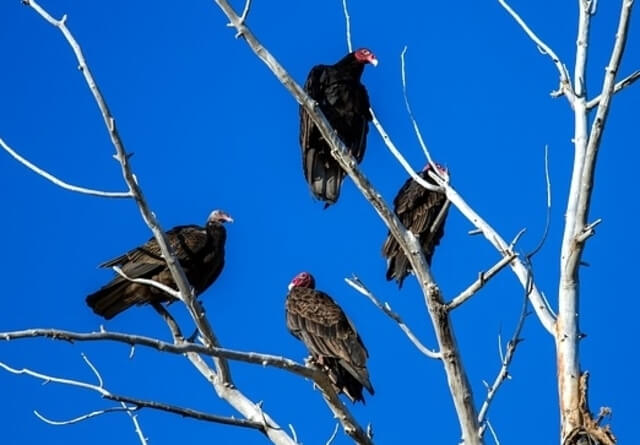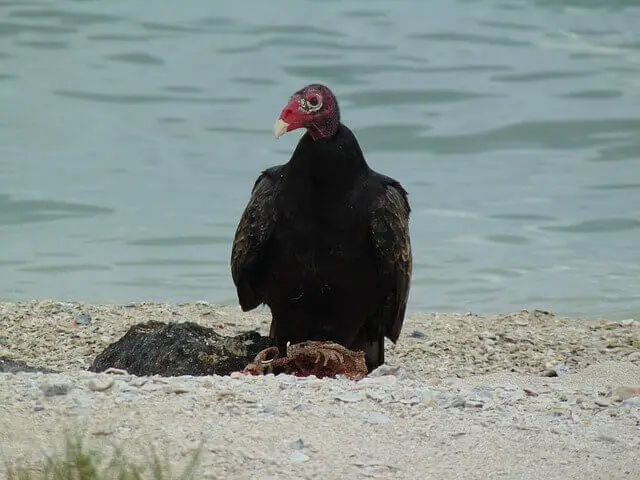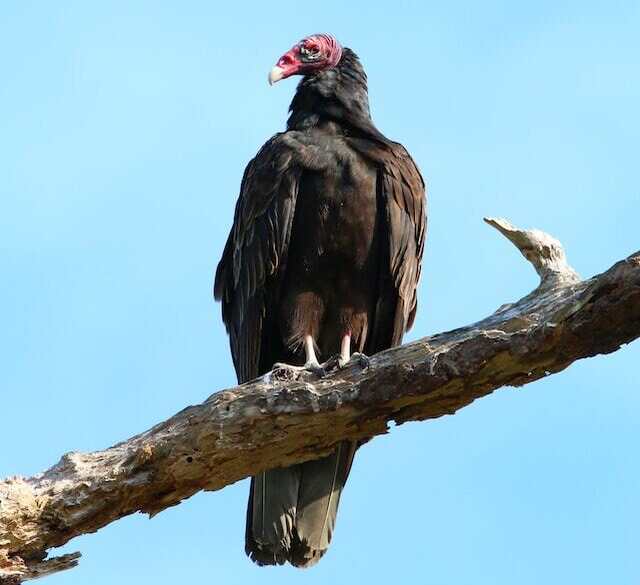Welcome to a deep dive into the world of the turkey vulture, one of nature’s most underappreciated yet vitally important creatures. Often misunderstood and even maligned due to their scavenging habits, turkey vultures play a critical role in maintaining the health of ecosystems across the Americas.
In this article, we will uncover intriguing Turkey Vulture Facts that shed light on their unique adaptations, behaviors, and their crucial contribution to the environment. Join us as we explore how these majestic birds silently clean our skies and enrich the natural world around us.
Table of Contents
- 1 Turkey Vulture Facts
- 1.1 Unique Digestive Adaptations
- 1.2 Distinct Feeding Behavior
- 1.3 Unconventional Roosting Habits
- 1.4 Efficient Flight Techniques
- 1.5 Specialized Courtship Rituals
- 1.6 Distinctive Vocalizations
- 1.7 Unusual Defecation Behavior
- 1.8 Docile Nature Towards Humans
- 1.9 Adaptable Nesting Preferences
- 1.10 Habitat Preference and Distribution
- 1.11 Conservation Status and Threats
- 1.12 Limited Captivity Viability
- 1.13 Non-Territorial Behavior
- 1.14 Predator Avoidance Strategies
- 1.15 Cultural Significance and Folklore
- 1.16 Role in Native American Traditions
- 1.17 Lifespan and Longevity
- 1.18 Geographical Range
- 1.19 Legal Protection
- 1.20 Cooling Mechanisms
- 1.21 Communal Feeding Etiquette
- 1.22 Impressive Wingspan
- 1.23 Ecological Contributions
- 1.24 Seasonal Migration Patterns
- 1.25 Distinctive Physical Features
- 1.26 Generalist Diet Preferences
- 1.27 Keen Sense of Smell
- 1.28 Thermal Regulation Techniques
- 1.29 Can Fly for Hours Without Flapping
- 1.30 Social Mating Behavior
- 1.31 Aquatic Limitations
- 1.32 Nesting Challenges
- 1.33 Parental Defense Strategies
- 1.34 Temperature Regulation Methods
- 1.35 Takeoff Techniques
- 1.36 Versatile Habitat Adaptations
- 2 Author
Turkey Vulture Facts
Unique Digestive Adaptations
Turkey vultures possess a remarkable digestive system that allows them to safely consume carrion containing toxins. Their highly acidic stomachs and specialized livers break down bacteria and neutralize harmful substances.
Distinct Feeding Behavior
These birds tear open carcasses with their beaks and use their long, pointed tongues to extract meat, a feeding method ideal for tough carrion.
Unconventional Roosting Habits
When roosting, turkey vultures perch by standing on tiptoes and leaning forward to rest their chests on surfaces, conserving energy efficiently.
Efficient Flight Techniques
Turkey vultures soar in circular patterns to gain altitude, then glide effortlessly to cover vast distances with minimal energy expenditure.
Specialized Courtship Rituals
During courtship, turkey vultures engage in circling and soaring displays to establish pair bonds and communicate readiness to mate.
Distinctive Vocalizations
When threatened, turkey vultures emit a hissing sound to warn off potential dangers and communicate with each other.
Unusual Defecation Behavior
Turkey Vultures have a unique way of defecating, which involves projecting their feces out of their cloaca in a stream that can reach up to six feet. This behavior may help to deter predators and parasites from their nesting sites.
Docile Nature Towards Humans
Turkey Vultures are not aggressive towards humans and will usually fly away if approached. They are generally shy birds and will only attack if they feel threatened or cornered.
Adaptable Nesting Preferences
Turkey Vultures are not picky about their nesting sites and will often use abandoned buildings or trees as their nesting site. This allows them to adapt to a wide range of habitats.
Habitat Preference and Distribution
Turkey Vultures are not commonly seen in urban areas, as they prefer open countryside and natural habitats. However, they may occasionally be seen in suburban areas near parks or other green spaces.
Conservation Status and Threats
Although not currently endangered, turkey vultures face habitat loss and pesticide poisoning, prompting conservation efforts to safeguard their populations.
Limited Captivity Viability
Turkey Vultures are not commonly kept in captivity, as they are difficult to care for and require a large amount of space. Keeping them as pets is not recommended as they are undomesticated creatures.
Non-Territorial Behavior
Turkey vultures exhibit social behavior, often roosting and feeding communally without defending territories.
Predator Avoidance Strategies
Despite few natural predators, turkey vultures may fall prey to larger birds of prey such as eagles, utilizing their size and flight ability for defense.
Cultural Significance and Folklore
Turkey Vultures are important in folklore and have been associated with death and the afterlife in many cultures. They are often seen as symbols of rebirth and renewal.
Role in Native American Traditions
Within Native American culture, turkey vultures are revered as spiritual beings symbolizing transition and the afterlife, depicted in art and mythology.
Lifespan and Longevity
Turkey Vultures have a lifespan of up to 20 years in the wild, although they can live longer in captivity. Their lifespan depends on a variety of factors, including habitat quality and availability of food.
Geographical Range
Turkey Vultures are found throughout the Americas, from Canada to South America. They are a common sight in many parts of the United States and Mexico.
Legal Protection
Turkey Vultures are protected by law in the United States under the Migratory Bird Treaty Act. Without a permit, it is against the law to harm, kill, or capture them.
Cooling Mechanisms
Turkey Vultures have a unique way of cooling off, which involves defecating on their legs to cool down on hot days. This behavior is known as urohidrosis and helps to regulate their body temperature.
Communal Feeding Etiquette
Turkey Vultures are not aggressive towards other birds and will often share feeding sites with other vultures and scavengers. They are social birds and will often form large flocks.
Impressive Wingspan
Turkey Vultures have a wingspan of up to seven feet, which allows them to soar effortlessly through the air. Their large wingspan also helps them to cover large distances while using minimal energy.
Ecological Contributions
Turkey Vultures play an important ecological role as scavengers, helping to clean up carrion and prevent the spread of disease. They are often referred to as nature’s garbage collectors.
Seasonal Migration Patterns
Turkey Vultures are not migratory in some areas, such as the southern United States and Central America. They may stay in one area year-round if food and habitat are abundant.
Distinctive Physical Features
Turkey Vultures have a red, featherless head, which helps to prevent bacteria and other pathogens from sticking to their feathers while feeding on carrion.
Generalist Diet Preferences
Turkey Vultures are not picky eaters and will consume almost any type of carrion, including animals that have been dead for several days. They have been known to feed on a wide variety of animals, including raccoons, skunks, deer, and even other birds.
Keen Sense of Smell
Turkey Vultures have an excellent sense of smell and can locate carrion from over a mile away. They use their sense of smell in addition to their keen eyesight to locate food.
Thermal Regulation Techniques
By adjusting their wing positions and sun exposure, turkey vultures manage body temperature effectively, adapting to weather conditions.
Can Fly for Hours Without Flapping
Turkey Vultures can fly for hours without flapping their wings, using thermal updrafts to stay aloft. This allows them to cover large distances while using minimal energy.
Social Mating Behavior
While not socially monogamous, turkey vultures form pair bonds during breeding seasons, often returning to mate with the same partner.
Aquatic Limitations
Turkey Vultures are not good swimmers and may drown if they land in water. Their large size and heavy wings make it difficult for them to stay afloat.
Nesting Challenges
They do not construct elaborate nests and may lay eggs in shallow depressions or on the ground, occasionally using human structures.
Parental Defense Strategies
Turkey vultures are protective parents, though not aggressive defenders, preferring flight to confrontation when threatened.
Temperature Regulation Methods
Turkey Vultures can regulate their body temperature by changing the position of their wings and exposing different parts of their body to the sun. This allows them to stay cool on hot days and warm on cold days.
Takeoff Techniques
Turkey vultures may need to run or jump to gain lift-off due to their size and wing structure, excelling once airborne.
Versatile Habitat Adaptations
Their ability to inhabit diverse environments, from forests to grasslands, highlights their adaptability and resilience.
Related Posts: Vultures in Florida: Behavior, Conservation, Coexistence!

